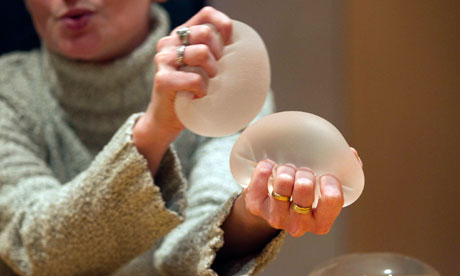
The government has launched a review into cosmetic surgery following the breast implant scandal, which could lead to tighter controls over advertising and the way private clinics operate.
Sir Bruce Keogh, medical director of the NHS, is leading the review at the request of Health Secretary Andrew Lansley. Professor Keogh is calling for the public to share their own experiences and give their opinions on what should be done to better regulate a controversial private industry that is often accused of exploiting vulnerable people.
The PIP breast implant scandal exposed shortcomings within the cosmetic surgery industry. Some leading private clinics did not have records of which patients had been given the implants which were filled with industrial silicone and more likely than others to leak. The review is expected to consider an implants register.
But many feel tougher regulation and checks are needed for clinics offering what are often considered more minor procedures, such as dermal fillers and laser treatment. There are also serious concerns over the qualifications of those who call themselves cosmetic surgeons.
"The recent problems with PIP breast implants have shone a light on the cosmetic surgery industry," said Professor Keogh. "Many questions have been raised, particularly around the regulation of clinics, whether all practitioners are adequately qualified, how well people are advised when money is changing hands, aggressive marketing techniques, and what protection is available when things go wrong.
"I am concerned that too many people do not realise how serious cosmetic surgery is and do not consider the life-long implications – and potential complications – it can have."
Keogh is concerned that the public is more concerned about costs than safety when considering cosmetic surgery. The department of health released a survey of 1,762 people showing that two-thirds (67%) of those questioned said cost was a factor but only 54% said they considered the qualifications of the doctor and only 44% undergoing surgery and 36% opting for other treatments thought about aftercare.
The review will look at regulation and safety of products and the skills and qualifications of those who carry out procedures. It will consider how to ensure the clinics have systems in place to care for patients during and after treatment, how to ensure people get accurate information, time to reconsider before embarking on treatments, and how complaints should be managed.
Peter Walsh, chief executive of AVMA (Action against Medical Accidents), pointed out that previous attempts to reform the cosmetic industry had fallen short. A review in 2005 under then chief medical officer Sir Liam Donaldson recommended statutory regulation of Botox injections, dermal fillers and laser treatments, but the department of health did not accept the need.
"My fear is that there is a political resistance to introducing any form of statutory regulation," said Walsh whose organisation has since helped patients who have suffered harm as a result of those procedures. "It has become somewhat politically incorrect to introduce regulation. That ideology in our opinion seems to have trumped patient safety in a number of cases."
The Royal College of Surgeons and professional associations welcomed the review. Consultant plastic surgeon Tim Goodacre, chair of the professional standards committee of the British Association of Plastic, Reconstructive and Aesthetic Surgeons, said they had campaigned long and hard for a register, but warned that "the remit [of the review] is huge - I'm not sure how they will satisfy the public's desire to see something done without masses of legislation."

